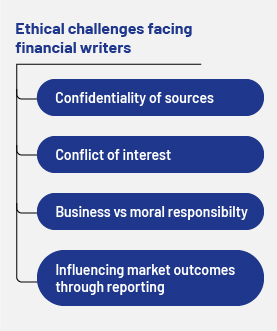Published on October 14, 2024 by Nitish Marwah
It has been more than a decade since one of Wall Street’s most reputed firms, Lehman Brothers, shut down after the US Department of the Treasury and the Federal Reserve failed to save it from going under. This crisis began in August 2007, when BNP Paribas decided to freeze access to USD2.2bn worth of funds based on sub-prime assets, citing woes in the US sub-prime mortgage sector that had been rattling the global markets at the time. The mayhem that followed gave rise to the worst financial crisis the world had witnessed since the Great Depression of the 1930s. By 2010, it had erased USD50tn worth of global wealth and reduced global economic output by approximately 5%.
One of the more long-lasting impacts was the erosion of trust in financial institutions, regulatory bodies and commentary writers and financial journalists. Quite understandably, any major financial crisis casts a shadow on investment and business writing professionals and raises multiple questions about this form of reporting. While the major economies expect a reduction in interest rates to soon become a reality, they continue to reel from the ongoing war between Russia and Ukraine and the geopolitical escalations in the Middle East. Consequently, it becomes increasingly important for investment writers to provide an independent perspective on key developments, setting aside their biases.
Improved standards of commentary writing – the need of the hour
Financial writers and journalists failed to foresee the 2008 financial crisis, leading to a general loss of faith in their work amid accusations that they failed to perform their watchdog function. These professionals play a vital role during such times. By providing clear and accurate information about a crisis, what caused it and its impact, financial writers can help both businesses and individuals to make informed decisions about their finances, enabling them to stay afloat and tide over the difficult period. With another recession looming, how can the standards of investment writing be upgraded to prevent this erosion of trust in commentary writers?
Understanding the news from a global perspective
Half of all Americans believe that national news organisations deliberately mislead the public, forcing them to adopt a particular point of view through their reporting, according to a recent survey by Gallup and Knight Foundation. Approximately 38% of those that consume news selectively avoid important news stories and developments, according to a survey by the Reuters Institute for the Study of Journalism. This growing distrust is attributed to the view that the media is being influenced politically or is motivated by commercial interests.
Furthermore, commentary writers are often seen as taking sides and encouraging a polarised set of opinions. At the same time, some are criticised for not calling out lies and for holding information back, ultimately keeping readers in the dark. A good writer, therefore, should be as transparent as possible about their biases, clearly differentiating between news and opinion.
The globalised nature of modern financial markets has made it clear that while financially integrated markets offer significant benefits such as an improved macroeconomic performance and greater risk sharing, they also pose risks that can have long-lasting impacts on the global economy. Consequently, it becomes increasingly important for financial writers to analyse a crisis at hand with a global point of view.
The effects of any global financial crisis are experienced differently by developed and developing nations. Commentary writers may be biased and report the happenings only in the major developed economies. However, it is the developing world that suffers the most. Consequently, examining the roots of a crisis and identifying its severity should be one of their first tasks. They should also be incentivised to raise contrarian views and connect the dots.
Making sense of the deluge of financial information in a timely fashion
Today’s high-frequency information environment has made data easily accessible to everyone. This is why a commentary writer should write only what is relevant. While this has made financial writing simpler, it has raised questions on how commentary writers check the credibility of the information and ultimately produce and disseminate it. Furthermore, they face ethical challenges when trying to influence markets or gain professionally.

Consequently, a writer should thoroughly research the topic at hand and consider diverse views before arriving at a conclusion. Relying on trusted sources and databases significantly reduces the risk of false news reporting. Academic sources are known to be more impartial and known critics of the financial system. Finally, since timing is of the essence in commentary writing, access to trustworthy data sources should be valued more than intuition, as it saves considerable time trying to validate potentially bogus information.
That said, the following are key points to remember when writing an investment commentary:
-
Write around a theme – This helps better convey a portfolio manager’s thoughts to readers. The theme can vary from the current market or macroeconomic events to a detailed portfolio analysis. They would, of course, need to communicate with the portfolio manager to ensure the commentary highlights what is most important to them.
-
Keep it simple – It is imperative to break up long and complicated write-ups using graphs and tables and avoid overuse of industry jargon. This enables the reader to consume information in a more engaging way.
-
Watch the tone – This enables a writer to refrain from inciting panic, especially important when delivering bad news. The writing needs to be factual but also reassuring.
-
Minimise compliance feedback – When working to tight deadlines, work with the compliance team to understand the type of language that should be omitted. Documenting and instructing your team go a long way in reducing compliance feedback.
-
Establish a robust review process – Proofreading the write-up is as important as writing it. Have a two-step review in place to avoid factual and grammatical errors.
Prioritise quality while maintaining productivity
While high productivity is good from a business perspective, a decline in quality erodes trust in the content being produced. Quality declines primarily due to not enough time being spent in obtaining all possible contexts and views. Automating data-driven financial commentaries while adhering to recommended practices is an effective way to counter this problem. Furthermore, make commentaries accessible as soon as feasible after the end of a reporting period. Automation can generate content with just a fraction of the work that manual authoring entails. The content could then be validated by writers, ensuring its quality.
How Acuity Knowledge Partners can help
We are a leading provider of high-value research, analytics and business intelligence to the financial services sector. We support over 400 financial institutions and consulting companies through our specialist workforce of more than 5,000 analysts and delivery experts across our global delivery network
We provide a service that combines process, people and technology. We help clients reduce manual intervention and increase efficiency in the fund commentary process, using the best tools. We help asset managers publish commentaries for all their funds and as fast as possible, integrating our domain and technology expertise to provide a holistic solution.
Sources:
-
https://eprints.lse.ac.uk/21663/1/What_is_financial_journalism_for_%28author%29.pdf
-
https://journals.sagepub.com/doi/full/10.1177/1464884917753556
-
https://www.edelman.com/edelman-trust-institute/rebuilding-trust/sharon-moshavi
-
https://reutersinstitute.politics.ox.ac.uk/calendar/role-business-journalism-financial-crisis
What's your view?
About the Author
Nitish has close to a decade’s worth of experience in the financial services industry. His expertise includes writing investment commentary across all asset classes, portfolio analysis, data analysis, automation, and project management. At Acuity, his responsibilities as a Delivery Manager include leading multiple projects and analysts to deliver monthly and quarterly macroeconomic reviews, capital market analysis, and workflow automation. Prior to joining Acuity Knowledge Partners, he worked as Lead Analyst for nearly five years with Zacks Investment Research, heading the firm’s Mutual Fund Research division.
Like the way we think?
Next time we post something new, we'll send it to your inbox







